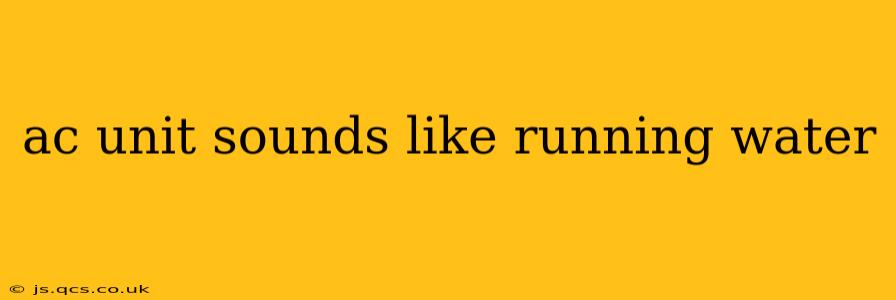Is your air conditioner making a sound like running water? This isn't normal and could indicate a few different problems, ranging from minor inconveniences to serious issues requiring professional repair. This comprehensive guide will help you diagnose the cause and find the best solution. We'll explore common culprits and offer practical advice to get your AC unit back to its quiet, cool operation.
Why Does My AC Sound Like Running Water?
Several factors can cause your air conditioner to emit a running water sound. Let's break down the most common reasons:
1. Condensation Drainage Issues
This is often the primary culprit. Air conditioners produce condensation as they cool the air. This water typically drains away through a condensate drain line. If this line is clogged, the water can back up, leading to gurgling, bubbling, or running water sounds. The sound might even intensify as the water level rises.
2. Refrigerant Leaks
A refrigerant leak can cause a hissing or bubbling sound that some describe as similar to running water. This is a more serious issue because refrigerant is essential for your AC's cooling function. A leak will not only cause noise but also reduce cooling efficiency. Never attempt to repair a refrigerant leak yourself; this should be handled by a qualified HVAC technician.
3. Airflow Restrictions
Restricted airflow can cause unusual noises, including sounds that resemble running water. This could be due to a clogged air filter, dirty evaporator coils, or obstructions within the ductwork. Poor airflow can also increase condensation buildup, exacerbating drainage problems.
4. Frozen Evaporator Coil
A frozen evaporator coil can cause a variety of strange noises, and a gurgling sound is sometimes among them. This is often caused by restricted airflow or low refrigerant levels. A frozen coil can also damage your AC unit, so addressing this issue promptly is crucial.
5. Problems with the Condenser Fan Motor
The condenser fan motor helps dissipate heat. If it's malfunctioning or struggling, it might produce unusual noises that are mistakenly interpreted as running water. This should be checked by a professional.
6. Pump Issues (If Applicable)
Some AC units utilize a pump to assist with condensate drainage. A faulty or failing pump can produce sounds similar to running water.
How to Troubleshoot the Running Water Sound
Here's a step-by-step approach to help you pinpoint the source of the noise:
- Check the Condensate Drain Line: Locate the drain line (usually a PVC pipe) and check for clogs. You can try flushing it with water or a drain cleaner designed for AC units.
- Inspect the Air Filter: A dirty air filter restricts airflow, leading to increased condensation and potential noise. Replace or clean the filter.
- Examine the Evaporator Coils: If you're comfortable doing so, inspect the evaporator coils for ice buildup. If frozen, turn off the unit and allow it to thaw before attempting further troubleshooting. Never touch the coils while the unit is running.
- Listen Carefully to the Sound: Try to pinpoint the exact location of the noise. This can help determine whether the problem is related to the condensate drain, the fan motor, or another component.
- Check for Refrigerant Leaks: Look for signs of refrigerant leaks, such as frost or ice buildup in unusual places. This is best left to a professional.
When to Call a Professional HVAC Technician
If you're unable to identify and resolve the issue, or if you suspect a refrigerant leak or other serious problem, always call a qualified HVAC technician. Attempting to fix a complex AC problem yourself could lead to further damage or even injury.
Preventative Maintenance to Avoid Future Problems
Regular preventative maintenance is key to avoiding AC issues. This includes:
- Regular filter changes: Change or clean your air filter every 1-3 months.
- Annual AC inspections: Schedule an annual inspection by an HVAC professional.
- Keep the unit clean: Clear debris and vegetation from around the outdoor unit.
By addressing the running water sound promptly and performing regular maintenance, you can ensure your air conditioner operates efficiently and quietly for years to come. Remember, safety first—if you're unsure about any step, contact a qualified technician.
